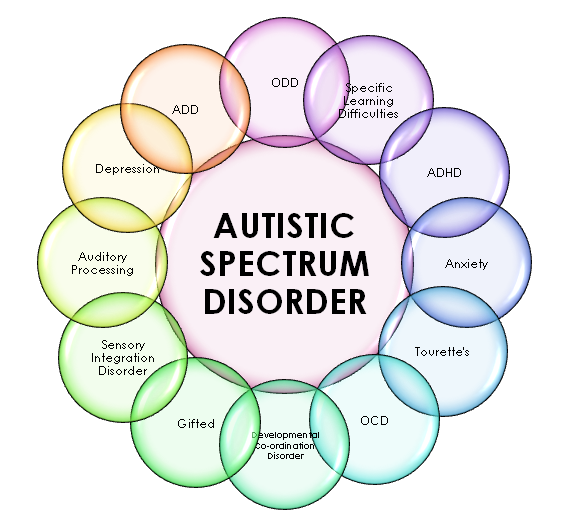The Significance of Household Support in the Journey with Autism
Wiki Article
Understanding Autism: A Comprehensive Overview to Indications and Symptoms
Autism Range Condition (ASD) encompasses a variety of features that can substantially impact an individual's social communications and everyday performance. Acknowledging the symptoms and indications, such as challenges with eye get in touch with, social interaction problems, and sensory level of sensitivities, is important for very early intervention. Comprehending these subtleties not only help caregivers and teachers in giving suitable assistance but likewise cultivates a more comprehensive setting for individuals with ASD. As we check out the intricacies of autism, it becomes necessary to consider exactly how these indicators manifest in a different way throughout the spectrum and what ramifications they hold for efficient treatment strategies.Summary of Autism Spectrum Condition
Specifying Autism Range Condition (ASD) includes acknowledging it as a complicated neurodevelopmental problem defined by an array of obstacles in social communication, interaction, and behavior patterns. The term "range" shows the large variability in signs and their seriousness, which can differ considerably from one individual to another. ASD generally manifests in early childhood, although some people might not get a diagnosis until later in life.Factors influencing the growth of ASD consist of hereditary tendencies and environmental factors, although the exact causes continue to be under examination. Diagnosis typically relies on behavior evaluations, as there are no conclusive medical examinations for ASD. Early intervention is essential and can significantly boost results, focusing on enhancing interaction abilities, social communications, and adaptive habits.
Individuals with ASD might likewise exhibit distinct toughness, such as remarkable interest to detail or particular areas of knowledge. Recognizing the diverse nature of ASD is vital for cultivating an inclusive environment that accommodates neurodiversity. Continued research is important for establishing reliable interventions and support group, making it possible for individuals with ASD to thrive and accomplish their potential within society.
Usual Signs of Autism
Identifying the usual indications of Autism Range Condition (ASD) is vital for early identification and intervention. These indicators can vary commonly in extent and discussion, yet specific characteristics are often observed in people with ASD.One of the most common indicators is a significant difficulty in developing and keeping eye contact. People may also show minimal rate of interest in social communications and show a choice for singular play. Repeated habits, such as hand-flapping, shaking, or rotating things, usually emerge early in youth. Furthermore, some youngsters might develop stringent regimens and come to be troubled if these regimens are interrupted.
Sensory sensitivities are likewise common; people may underreact or overreact to sensory stimuli, such as structures, lights, or noises. autism. Language development can be irregular, with some kids exhibiting postponed speech or using language in unusual methods, including echolalia-- duplicating sentences or phrases listened to somewhere else
It is necessary to note that not every person with ASD will show all these signs, and the level of these habits can vary significantly. Early acknowledgment permits for timely assistance and resources, boosting the lifestyle for those on the spectrum.
Social Communication Difficulties
Social interaction challenges are a characteristic of Autism Spectrum Problem (ASD), impacting an individual's ability to involve effectively with others. These difficulties can materialize in numerous ways, including difficulties in launching and maintaining conversations, recognizing social cues, and responding properly in social communications.Individuals with ASD might deal with nonverbal interaction, such as eye get in touch with, facial expressions, and body language. This can result in misconceptions, as their communicative intent might not be correctly interpreted by others. Moreover, they may discover it difficult to understand the nuances of tone and context, which are crucial for reliable interaction.
In group setups, individuals with ASD might really feel overloaded and might not understand just how to join in conversations (autism). They could additionally display atypical conversational patterns, such as monologuing about specific rate of interests without acknowledging social reciprocity
Additionally, these difficulties can lead to social seclusion or difficulties in developing relationships, as go to this web-site peers may misinterpret their actions or interaction style. Understanding these social communication challenges is vital for fostering helpful atmospheres that advertise social skills growth and improve the top quality of interactions for people on the autism spectrum.
Sensory Feedbacks and sensitivities
Numerous people with Autism Range Condition (ASD) experience heightened sensory level of sensitivities that can significantly affect their day-to-day lives. These level of sensitivities may show up as over-responsiveness or under-responsiveness to sensory stimuli, consisting of noises, lights, appearances, preferences, and smells. As an example, an individual with ASD might find daily sounds, such as a vacuum cleaner or crowded settings, extremely upsetting, causing anxiousness or disasters. Conversely, some might show an indifference to discomfort or severe temperature levels, which can present safety and security problems.Sensory handling differences in individuals with ASD can additionally impact their capability to take part in social interactions and routine tasks. A kid who is delicate to touch might withstand physical affection or prevent specific apparel fabrics. A choice for certain appearances or tastes can limit dietary alternatives and develop obstacles during mealtimes.
Comprehending these sensory level of sensitivities is necessary for identifying the unique experiences of people with ASD. Understanding of their sensory accounts can his comment is here cultivate far better communication and assistance approaches, developing an atmosphere that accommodates their needs and improves their lifestyle. Eventually, recognizing sensory level of sensitivities is a crucial element of comprehending the wider spectrum of autism.

Supporting People With Autism
Reliable assistance for individuals with Autism Spectrum Disorder (ASD) is important for enhancing their general health and promoting self-reliance. Support methods should be tailored to satisfy the unique requirements of each person, considering their challenges and strengths.
Social skills training can additionally play a pivotal duty. autism. Engaging people in team tasks or role-playing scenarios can improve their capability to navigate social communications. Additionally, it is vital to educate household participants, caretakers, and peers regarding ASD to promote a inclusive and encouraging community
Final Thought
To conclude, a detailed understanding of Autism Spectrum Condition is important for identifying its symptoms and signs. Early recognition of usual features, such as social interaction challenges and sensory sensitivities, makes it possible for teachers and caregivers to carry out efficient interventions. By cultivating boosted interaction and social skills, people with autism can navigate their atmospheres more efficiently. Inevitably, increased awareness and support can considerably enhance the lifestyle for those affected by visit ASD.Autism Spectrum Condition (ASD) encompasses a vast range of attributes that can substantially affect an individual's social communications and day-to-day performance.People with ASD might struggle with nonverbal communication, such as eye get in touch with, facial expressions, and body language.Several people with Autism Spectrum Problem (ASD) experience enhanced sensory sensitivities that can substantially influence their everyday lives.Sensory handling distinctions in people with ASD can likewise influence their ability to involve in social communications and regular activities.Understanding these sensory sensitivities is crucial for recognizing the unique experiences of people with ASD.
Report this wiki page